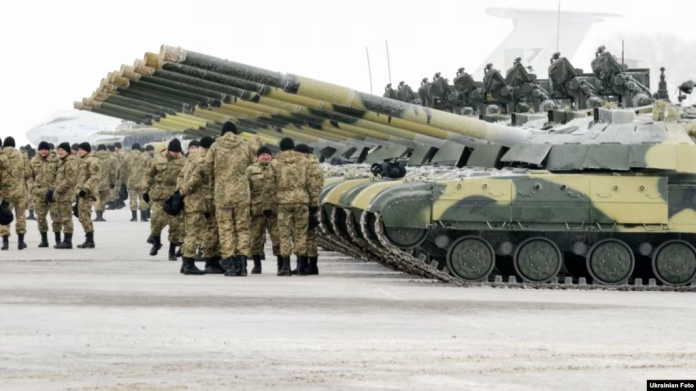The year 2023 is ending for Ukraine with Russia reinforcing its defence positions and the US, Kyiv’s biggest military contributor, potentially cutting off financial and military aid, according to The Atlantic.
Since the war broke out in February 2022, Ukraine has relied on foreign aid to defend itself. In addition, foreign countries and institutions fund most of the Ukrainian government’s non-military spending. Together, they have provided the country with approximately $100 billion in military defence aid, with the United States donating about half of that amount.
For decades, Ukraine has struggled with two challenges: defence corruption and weak industry. Long before the war, Kyiv was buying military equipment at inflated prices and using underground intermediaries in the arms trade. Daria Kaleniuk, a co-founder and the executive director of Ukraine’s Anti-Corruption Action Centre, stated:
“Our military is not being properly equipped. The challenge to the country was huge, and our state, particularly our Ministry of Defense, was not able to provide the army with everything it needed.”
Ukraine’s defence sector has long played a fundamental role in the country’s image. Improving the productivity and functionality of this sector is crucial to the country’s ambitions to become an integral part of the West. To gain sustained NATO support, Ukraine needs to demonstrate a cleaner and arguably larger defence sector.
After the collapse of the Soviet Union, Ukraine needed money, especially for gas, rather than large armed forces. And Russia forgave Kyiv a significant part of its energy debts in exchange for military stockpiles. Ukraine made even more money by selling most of its stored weapons: in the early 2000s, the country exported tanks, guns and other armaments around the world. Andriy Zagorodnyuk, the country’s defence minister from 2019 to 2020, said:
Ukraine wasn’t planning to be a superpower. We certainly weren’t planning on waging any wars.
After the loss of Crimea in 2014, Kyiv radically changed course, more than doubling its defence budget. The share of state spending on the army increased by 106 per cent. However, even though the state has increased spending, corruption has not vanished.
The problem dates back to Soviet times, when manufacturers regularly bribed officials to buy overpriced equipment, and graft is deeply embedded in the work of the defence ministry.
According to a 2012 analysis by Leonid Polyakov, a former senior Ukrainian defence official, officers took military materials and used them to build houses. Some officials even auctioned off land belonging to the defence ministry.
The problem persisted even after the 2014 Maidan revolution. In 2019, the son of a senior defence ministry official was caught bribing military factories to buy overpriced goods he had smuggled in from Russia.
Western officials took notice of the struggle in Ukraine, with then-Vice President Joe Biden addressing the Ukrainian parliament in 2015.
“You also have a battle, a historic battle against corruption. You cannot name a single democracy in the world where the cancer of corruption is prevalent. Anything else will jeopardise Ukraine’s hard-won progress and drive down support for Ukraine from the international community.”
The military conflict started in February 2022, with Ukraine’s defence spending increasing sevenfold between 2021 and 2022. The share of defence spending in GDP has increased tenfold. Kyiv does not report what percentage of this amount goes to military production, but it is undoubtedly significant.
Viktor Lokotkov, the chief marketing officer for the drone maker Skyassist, claimed that corruption paralysed his supply chain. His company imports necessary components from other countries, but when the company’s products reached the Ukrainian border, customs officials held them for ransom.
His company is not the only one facing this problem: in early 2023, one of Ukraine’s leading lawmakers estimated that the state was losing $271 million a month to customs bribes, an amount that was roughly the same before the war.
Public pressure led to important changes. In September, Ukrainian President Volodymyr Zelensky replaced Reznikov with an official experienced in rooting out bribery. He also changed the minister in charge of military production and the official running the state-owned defence company.
The state has also launched investigations and arrests of customs officials, and sacked the top leadership of its customs service. Even so, however, Ukraine seems far from regaining Crimea and other territories.
The boasted counter-offensive has stalled, with Kyiv playing defence in many parts of the country. Relations with the West have soured and anti-Ukrainian politicians are gaining prominence in Europe. In the US, House Republicans are blocking a new aid package in Congress.
The only thing Ukraine can still do to strengthen its army and gain Western support is to expand and clean up its defence sector.
Therefore, for Ukraine, ending corruption in the defence sector could be crucial to victory. Over the past six months, Ukrainian officials have made it clear that they see a vibrant defence industry as a means not only to win the war, but also to boost the country’s economy afterwards and link it to the West.
Becoming a major arms exporter to the West would be a transformative achievement for Ukraine, and NATO and EU membership would look much more attainable. Yet Kyiv is still far from achieving this goal.
Its anti-corruption activists and defence entrepreneurs hope the West will show patience and faith. Kaleniuk believes the cleansing and scandals are signs that the country is changing.
There are forces inside the country that are pushing and driving for change.
